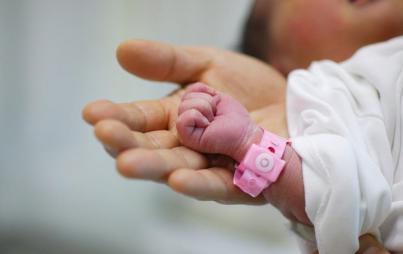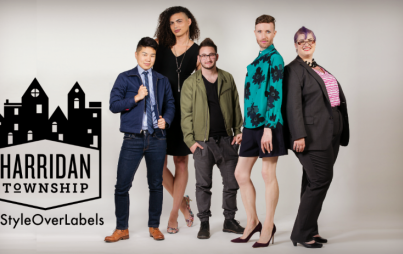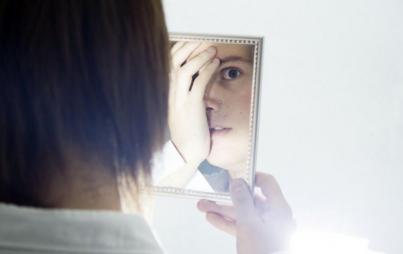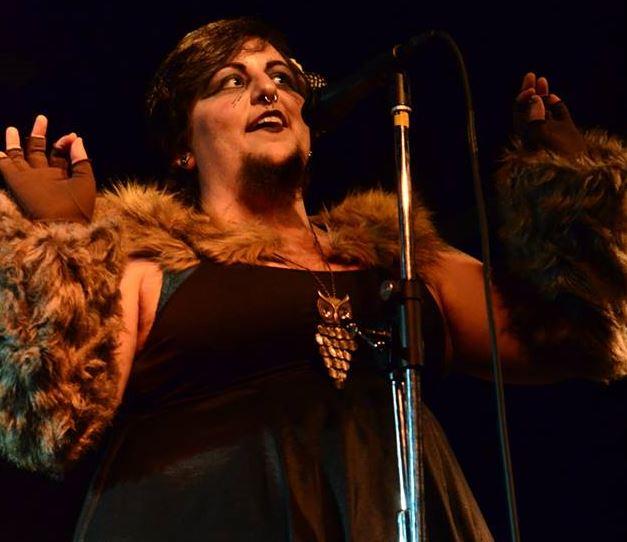
A post-holiday Skype call unfurled into an interview tender and majestic, not unlike the beard that punctuates performer Little Bear Schwarz' opulent visage.
That's it.
That's the leadup.
Let’s indulge in some squareness and start at the beginning. How did you come to grow out your beard, and has it always been a conscious choice?
I had precocious early puberty. I started at 7 and seemed to have finished up by 11—kinda suddenly out of nowhere at 14 I started growing a lot of body hair, it started to creep up on my cheek and my neck and my face. I was assigned female at birth, and like anyone who is, you’re not really given the option of “do you want to keep it?” The discussion is A) Why is it happening? B) How do we fix it? C) In what fashion do you want to get rid of it? Is it sparse enough that you can wax it, is it light enough that you can bleach it, or is it a matter of devoting yourself to shaving every day.
So, I had a lot of tests that came back inconclusive—I just started seeing a new doctor and got tests back that I just have high testosterone, which is something they were never able to find before, which is weird.
My family was poor—we didn’t have the money to get laser removal, which people always casually recommend: “Why don’t you just laser it?” Do you want to give me the money for that? It’s crazy expensive.
All I could do is shave it every day. For the next 14 to 16 or so years, I shaved my face and neck every day. We’re just taught that men can have facial hair and women can’t—I wasn’t really cognizant of non-binary identities at that point.
The process was really slow. In my mid 20's, I think I stumbled on an online group of women who stopped shaving their body hair, and that was this new thing to me—I had never heard of that, I didn’t even know that was a thing. I was interested; I had never found it disgusting or ugly. It was on and off—I would stop shaving my armpits or my legs and then I’d get into a relationship and they were like “I’m not cool with that” so I’d have to shave.
By the time I was 27 or 28—I stopped shaving my body hair, because I didn’t want to, and educated myself on body autonomy. I realized I didn’t owe anyone anything, but I still had a lot of shame associated with my facial hair because, like, underarm hair and leg hair and pubic hair—we understand that’s something that women have, even if they “shouldn’t” keep it. We understand that it’s something women grow.
The facial hair was something I didn’t know what to make of. There was also the issue of employment. Even if I could embrace it, where am I going to get a job? So I continued to shave it every day.
Armpit hair is really embraced by punks, right? It’s almost a fetish, now. But facial hair hasn’t had that embrace of appeal. Despite the femmephobia of dyke punk circles, there’s still this taboo—it’s non-desirable to have facial hair.
I know several women, who are female identified, who are very butch, and identify as very butch—even the ones who can grow a beard are still really on top of making sure it doesn’t show.
It’s interesting how people can embrace body hair but still not facial hair, which is very much how I was for a long time.
I came out as genderqueer when I was 30. A lot of people have asked me if there’s a link there—"Are you bearded because you’re genderqueer? Is that an expression of your queerness?"
The thing is: I don’t think so. Even if I always identified as a woman, eventually—perhaps not as soon—but eventually, I’d have embraced this. When I turned 30, I stopped feeling the need to live up to anything. People know what women are. There are certain images of what women should be. People know what men are and should be, but genderqueer is something that a lot of people don’t know of, and while that’s kind of a negative thing, there’s also a kind of freedom in having this identity that’s not established enough in society that people have associations with.
People don’t think “genderqueer” and think of a look—maybe we as a community do, but in the greater scheme, there’s still this freedom of not having a role to live up to. When I came out, I started to embrace the facial hair—I thought “now that I don’t identify solely as female, I don’t have to have this female shame around my facial hair."
I moved out to Seattle 9 months ago and started working from home—my partner and I had a set discussion where he said, “You know, you’re really not in a position where you need to shave it—I know you have it, I’m fine with it, and we live in a very progressive city” and suddenly the need to shave just wasn’t there. Like, I literally had no reason not to. So I’ve only had this for 8 or so months. The ability’s been there for about 17 years. 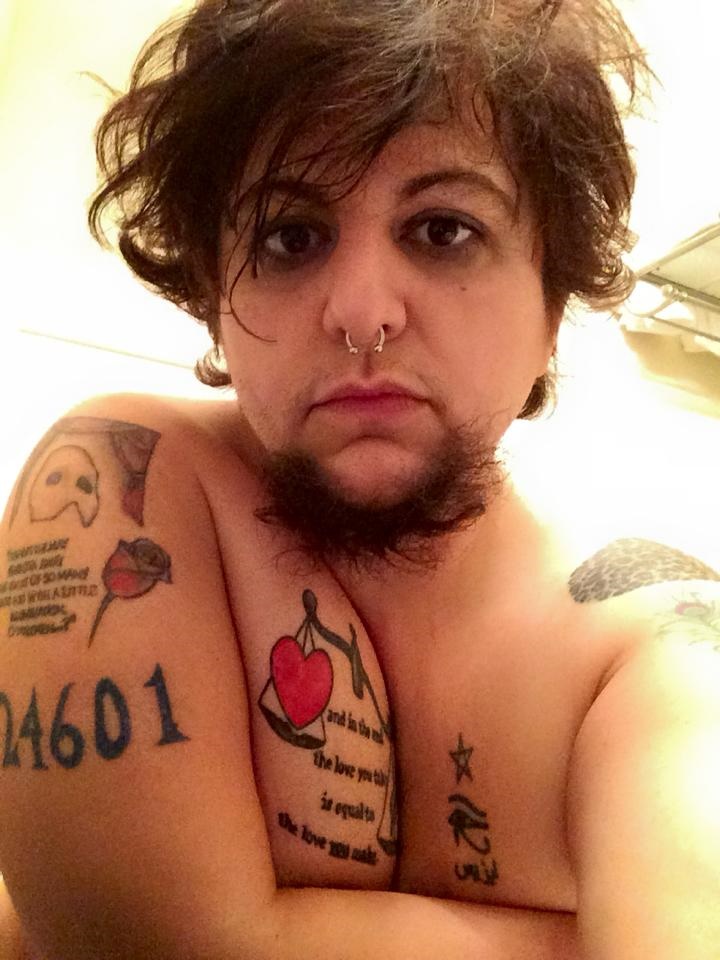
There’s a difference between “I accept this thing about my body” and “I’m encouraging this from my body.”
In June, I wanted to see how far I wanted to take this “bearded lady” persona and I actually entered a beard contest. There was a category for “whiskerinas,” which traditionally is for women to fabricate beards—like, they craft them out of yarn or paper mache or whatever—but I was like “I’m gonna go for it, let’s see if bearding is a thing I want to do.” Not only did I win, but it was a really, really fortuitous event because I kind of met everyone in my network of performers and artists that very day—they were all in the contest.
I met a sideshow revival troupe called The Wreckless Freaks. Sideshows have staples, and when people think of sideshows, they think of the bearded lady. There is a sort of carnival association with it. They were probably looking at me with marketing ideas—they came to me and asked “is this something you would consider objectifying or fetishizing,” and I was just ecstatic because it sounded so exciting and I just jumped at it.
I started meeting people who would book me with singing gigs—almost everyone who I had met in the performance scene, I met that day. So, getting involved with The Wreckless Freaks really solidified my identity, as a bearded lady.
They were cognizant of me being genderqueer and they asked me if marketing myself as a bearded lady was undermining my identity—genderqueer means something different to everyone, but in my case, I like to consider myself genderful, like an abundance of male and female and everything in between, so marketing myself as a bearded lady is not inaccurate, just incomplete.
Usually, a person’s stage persona is a sectioned off or concentrated version of their real live self—I didn’t think it was “gender moonlighting” if I was just one thing on stage and one thing off-stage because it’s just a part of who I am.
I’ve gotten into the bearding scene. I have a regimen. I condition it every day. Sometimes I put the little curls in it—I straight iron it. I’m definitely a person whose embraced it.
You have a very femme presentation, which is in accordance with the bearded lady aesthetic. The bearded lady is always the most feminine—
It’s all about the contrast. We’re always in the fluffiest dresses, with the most makeup, with the most flowers in our hair—because it’s about showing that juxtaposition.
There’s this threshold—as a transgender woman, people are always trying to find proof that I’m not a woman; a little stubble on me betrays that I’m not “really a woman.” But when you’re a woman with a beard, everyone’s attention is focused on whether the beard is real. The gender issue becomes secondary.
People ask if I get mis-gendered, based on the idea that I’m a cis female, which I’m not but say if I were: People are judging me by my height and voice and mannerisms, which are coded “girly,” so I never get that. Rarely is it a matter of “are you a man or a woman.” It’s always, “Is that real?”
People always want to touch it—I like to say they’re lucky, because I’m very chill with questions and people wanting to know. I get more upset when people stare and then whisper. Obviously you have questions, I wish you would come to ask. People asking to touch it or if it’s real doesn’t bother me at all. I’ve had people tug on it without asking—they’re very lucky I’m understanding about it.
I get what you’re saying—the gendering of hair. In the binary trans community (male to female, female to male), facial hair means something different than it does for people who like genderbending or genderfuckery. I used to go on this rant—in the bearding community, there is a lot of cis male chauvinism: “This is our bond, this is our scene.” It’s sort of a boys-only treehouse, and I’ve gone on a lot of rants about how your beard does not make you a man; beards are not male, beards are not gendered. You don’t own beards, they belong to everyone.
I had a trans man tell me “I need you to understand that for trans men, to grow a beard is a very validating thing for us, and for a trans woman, having a beard can be very dysphoric”—I’m kinda glad someone called that to my attention. In my quest to show people that hair doesn’t have to gender you, in trying to be inclusive, I was inadvertently undermining a very trans-specific experience.
I’m glad someone called that to my attention—I’ve since altered my rant to say that hair doesn’t have to make you masculine or feminine. It’s a very personal experience. For me, my beard doesn’t make me more masculine or feminine, it just makes me who I am. At the same time, I can’t speak for a trans man or trans woman’s experience—when a trans woman says she wishes she didn’t have to shave every day, that’s not the time for me to pipe up with “but beards aren’t masculine.” That’s me hijacking. I’m glad that you brought that up.
On the flip side of that, looking at your pictures has actually inspired me to grow out my own hair. Full circle! I imagine that as a feminine person moving through the world—you know, when you go into a Lush, or a Sephora, you are always approached under the guise of “correcting” something about yourself. Do you get advice on how to compensate or “work around” for your beard?
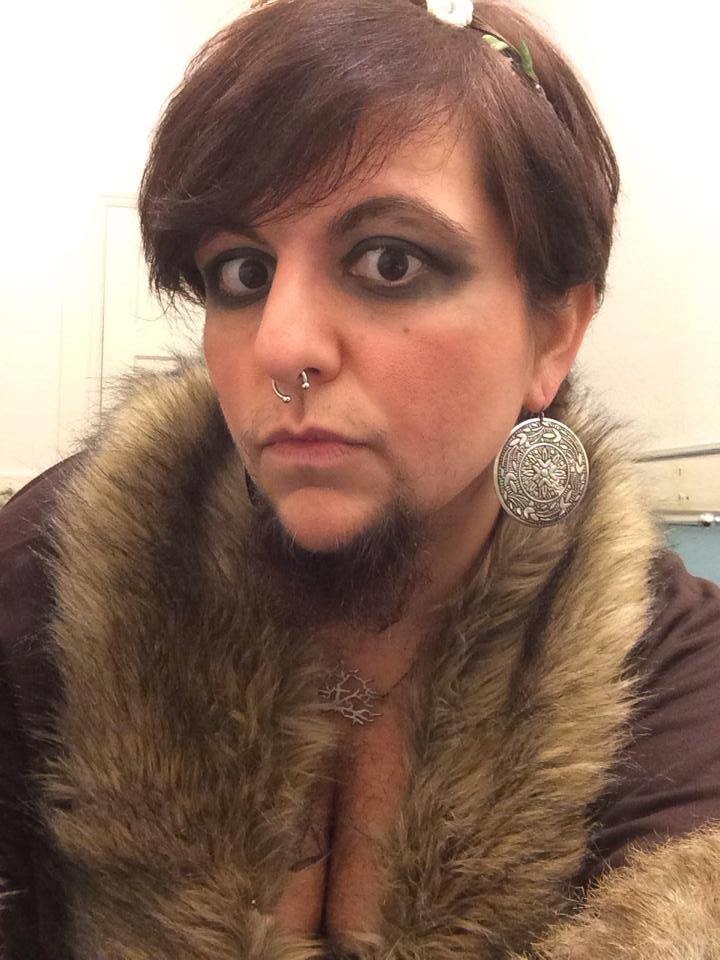 Funny enough, I think this might be a regional thing. I grew up around New York City—we’re very frank people. I would walk into a hair salon and ask “Can I get my eyebrows done?” and they’d go “Do you want us to do your lip, too?” They’d be polite, but they’d let you know.
Funny enough, I think this might be a regional thing. I grew up around New York City—we’re very frank people. I would walk into a hair salon and ask “Can I get my eyebrows done?” and they’d go “Do you want us to do your lip, too?” They’d be polite, but they’d let you know.
Seattle is weird—it’s got this stoic Scandinavian thing going on, and people are more prone to not saying anything until you leave. You know, like when you have a big zit and you hope no one sees it and you catch everyone you’re talking to looking at it and then looking away? That’s what happens more here—no one says it to me, I can see them looking at it, and then I imagine, once I leave, it's, “Did you see that?”
Sometimes I wish people would feel emboldened to ask rather than look and feel like it’s rude to.
Would you ever work as a mall Santa?
I might, if the pay was good!
Beards are, beyond “gendered,” the defining feature of so many historical figures. Where do you take your aesthetic cues amidst such a rigid historical context, i.e. when our attitudes toward beards are so binary they are named after men who furthered the gender binary?
That’s my issue with a lot of the bearding community—that it’s a very cisheteronormative “beards make us manly and virile” sort of thing.
I’m really not a pioneer in what I’m doing. There’s not many of us, female bodied or female identified people who are bearded, but I have met Jennifer Miller, who is absolutely an icon—not just in how she looks, but also in her bravery.
She was one of the first people I’d ever seen who was openly bearded and female bodied.
There’s a woman in England, she’s Sikh, Harnaam Kaur—
I was actually going to ask you about her.
We’re friends! There’s a funny joke that all the bearded ladies know each other. There’s about 10 of us. Whenever we see something about bearded ladies on Facebook we tag the others in.
I think Harnaam is an inspiration. I like how open she is about it, too.
Do you relate, to the degree you can, being a non-Sikh, to their understanding of facial and body hair as a gift?
Yeah—I mean, it took a long time to see it that way. Going back to the beard competition: if I’d not had the beard, I might not have the bravery to grow it out, enter the competition, and meet the people at the freak show, who have become like my family.
It sounds silly, because I’d like to think of these people outside of my beard, but really my beard has allowed me to have an in within the performance community. I may have come in with very little experience and not knowing many people, but it’s a marker, you know what I mean?
People could say “Little Bear, the one who sings, the short one, the chubby one, the tattooed one”—I want people to know me beyond the beard but, it did supply me with that in.
When I moved to Seattle, I didn’t want to just be a citizen of a city. I wanted to be a part of what’s happening in that city.
Describe to me the cross-section of people who exhibit romantic and sexual attraction to you. I imagine a lot of people might put upon you this scenario and fantasy of “the woman who men who are attracted to men can like!”
I guess because I’ve always surrounded myself with artsy people, a lot of the people I know identify as bisexual or pansexual or at least homo or heteroflexible. When people are attracted to me, I don’t know if they’re veering outside their type.
My current boyfriend identifies as heterosexual. It doesn’t create any sort of rift between us. He says that I make a beard very feminine, which I think is kind of sweet!
I also date all over the spectrum. I haven’t dated other queer people yet, but I know several—I’ve dated men and women. I seem to attract that same spectrum. 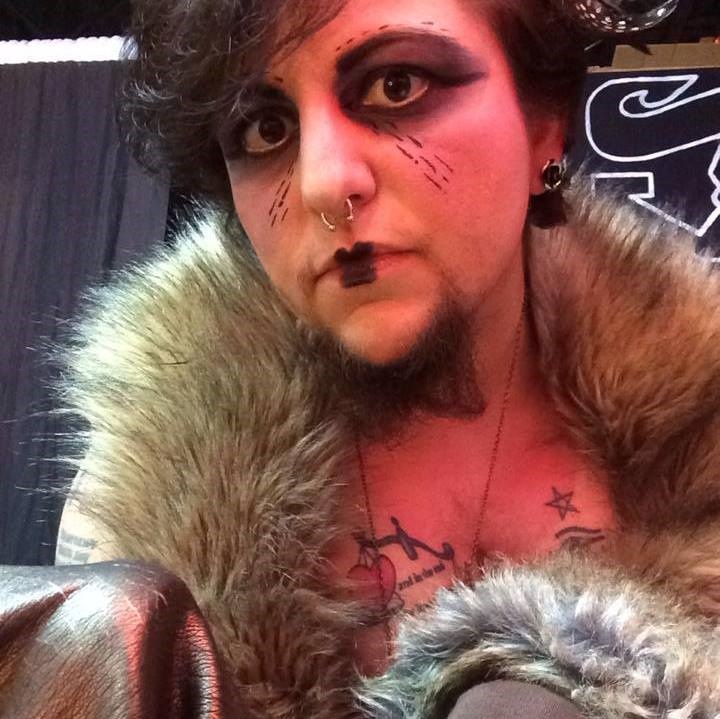
Also, in Seattle, it’s become an in-joke; when you do meet someone who is not polyamorous or is completely heterosexual, it’s like, “Are you lost?”
I’ve always surrounded myself with people who were very broad in their orientations and identities—it doesn’t really occur to me that people might be dating me outside of their type.
In the Bay Area it’s the same thing. I was on a date with someone and an hour and half in they said, “Oh by the way I’m monogamous.” Well, why would you agree to see me if you knew I had three other partners? “I wanted to see what would happen.” We, especially in the Pacific Northwest, put forth polyamory as a political ideal, which quantifies people’s worth according to their sexual availability. So when someone who is not poly meets a poly person and we’re not a gross social climber, they’re just disarmed. Which I like to do! Anyway: Do you ever coordinate your manicure to the color of your beard?
I don’t do much in the way of coloring my beard, only because it ties into beard care. I don’t want to mess with it too much. I condition it really heavily, I put in a lot of oils, I comb it—I’m afraid of doing anything that might damage the hair. I love when people want to touch it. They’re like, “It’s so soft!” They’re so delighted by how soft it is. So I don’t want to color it too much.
When I’m on stage, I do like the juxtaposition of wearing lots of makeup and being very manicured with the flowers in my hair and the high heels—and then having a beard that is very feminine. I’ll curl it, I might put ribbons in it. I present it as yet another thing to primp. Like nails, like shoes, like lips, it’s another thing to make pretty. I like presenting.
If you were to cosplay a character or a famous person and feature your beard as an addition to the character rather than as something that came “in stock,” as it were, who would it be?
That’s a great question—I never think of it because I’m not involved in too many fandoms. I’m a big fan of Avatar: The Last Airbender. A bearded Kitara would be cool!
A lot of my fandoms are of musical theater—a bearded Christine Daaé from Phantom of the Opera would be cool. I’m a big Lord of the Rings fan, but the joke already is that I’m a dwarven female.
A bearded Azula would be pretty bitchin’!
Within the last decade or two, Freaks has become this fixture, a social symbol. You go to someone’s house and they have a poster of it up in their living room and that’s how you’ll know they’re with it, they’re counter culture. But this retroactive appreciation ignores that freak culture was very close knit—the movie is all about how people like that guy with the poster will never understand their struggles or their world.
I’m actually a big Tod Browning fan. He was a fan of working with Lon Chaney, who was one of my big inspirations. Many of my inspirations were silent actors—silent performers really had the lockdown on how to express themselves nonverbally.
I love Tod Browning on that front because of his body of work. I love Freaks. I think I liked it long before I ever considered growing my beard—I found the idea of creating a microcosm based on the intolerance of the outside world a beautiful concept. Maybe it was a bit of foreshadowing.
When I was young, it was Clockwork Orange. If you knew the kid who had a Clockwork Orange poster, he was the cool kid.
People question whether Freaks did more harm than good, whether it made people more afraid—some people have a fear of carnies the same way they might have a fear of clowns.
I actually thought it was a beautiful movie, and in 1932, it was hella brave to put out a film like that.
I like to shift the locus of interrogation back onto myself, if for but a moment when I have these discussions. You’ve been seen a lot. I’d like to give you the option to see. Pop quiz, right now. Ask me something.
I am genuinely curious what about my pictures made you want to embrace your body hair. And also about your life and your experience being a trans woman and when you realized, and what that’s like—I don’t want to be invasive because that’s not something everyone can talk about.
Well, you’re very pretty, and when someone you admire does something it makes it easier for you to do that thing also.
I grapple: On one hand, I hate it when any woman or femme-presenting person hurts or doesn’t like herself—
Well we’re conditioned to. Look how many businesses are built on keeping us insecure. It’s horrible.
On the other hand, I feel an immense solace when other women share those feelings with me in solidarity, in response to me being public about my hurt and self-hatred. Ultimately, it’s the only thing we all have in common, as women (or people who pass as women, have histories, etc)—that social conditioning to proofread our own appearances.
I’ve been following the anti-police protests in Oakland. Protesters see me in a dress and stockings with a gas mask and approach me under the premise that I’m just a crossdresser. It’s always positive, but its, “Wow, you look great, good job” versus, “Oh yay, the media is here and maybe they’ll not be assholes about this.” Which is OK! I don’t mind if people mistake me as a crossdresser—it’s not a bad thing to be. It’s not who I am, but that kind of antipathy toward other maligned folk quickly degenerates into an oppressive worldview that corroborates with violence.
You’re genderqueer; if I held a gun to your head and told you to describe it to me in definite terms, you couldn’t. It’s like a bubble. If you try to impose too rigid a pressure onto it, it’ll burst. So that’s how I’m trying to move forward. Just let the bubble float.
I think that’s a very healthy point of view. I know a lot of trans women who do try to grow out their facial hair, and they get a lot of shit! They get that, “Well how can I take you seriously now?”
It’s weird to me how respect for a person is contingent on how definable they are. No one deserves any less respect for their identity based on how they match your perception. That’s just so off to me.
If someone tells me they identify as female, that’s all I need to hear! I would never say “well obviously you’re not trying hard enough.” That’s none of my business, and it’s not for me to define.
To stick the landing gently here: What do you use?
Actually, I go to the black hair care section and I buy those big tubs of super intense conditioner. I don’t shampoo It, I just leave conditioner in for the length of the shower. I also use Indian hair paste. I’ll brush it, I’ll seal the curls with it a little bit.
Like I’ve said, everyone I meet says it’s soft as a cloud.
They see a feminine bearded person and then have to reassure themselves that it’s not weird by saying “it’s so dainty!”
Which is why I’m really comfortable and into open communication. My attitude is this: Through communication, we create visibility, and through visibility, we create acceptance.
If I am so unapproachable—“can I ask you questions?” "NO!"—by creating a wall, I feel like I’m doing any favors for anyone who might come after me, who might also want to grow out their beard in a world that doesn’t welcome it.
If I’m not approachable, I’m not helping them at all.

